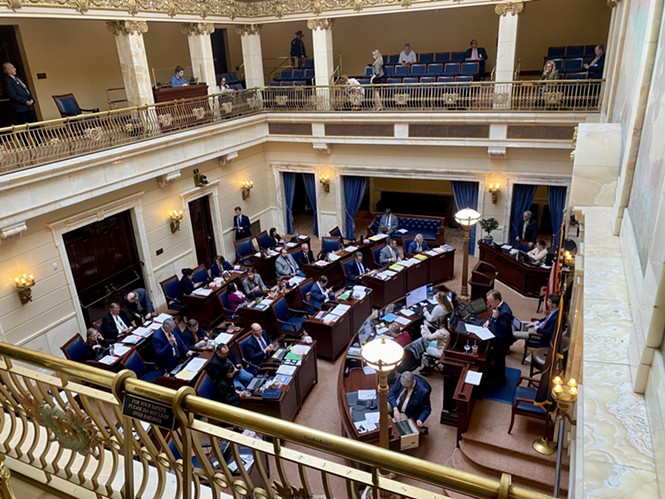Utah's ranked choice voting pilot survives repeal attempt in narrow Senate vote
Die Another Day
By Benjamin Wood @BjaminWoodCAPITOL HILL—Utah cities will have one more chance to test out ranked choice voting in 2025 after a bill to prematurely end the state's optional pilot program failed to clear the Senate on Wednesday.
Senators voted 15-12 against HB290, which had already passed the House last week on a vote of 43-26. The pilot program permitting ranked choice—also known as instant-runoff voting—applies only to municipal elections and is set to expire in 2026. But critics argued that confusion experienced by some voters during the 2021 and 2023 election cycles is enough to demonstrate the pilot's failure.
"I think many people, when they are asked to fill out a ranked choice voting ballot, do not really understand how they are doing it," said Sen. Ann Millner, R-Ogden, the bill's Senate sponsor. "There is nothing more important to us and to this republic than having a voting process that people trust."
Ballot confusion is nothing new, but the issue of "election integrity" has taken on a much darker tone in recent years as political actors like former President Donald Trump have actively, and falsely, cast doubt on the outcome of elections they lose. There is no evidence to suggest that Utah's elections are faulty, but that has not stopped calls for enhanced security measures around balloting and efforts to roll back the state's move to universal mail-in elections.
With ranked choice, participating cities are able to avoid the cost of a primary election by placing all candidates on the November ballot, with voters then able to rank each candidate by order of preference. As losing candidates are eliminated, their supporter's ballots are redistributed to the voters' next choice until a majority winner is secured. Proponents also argue that the format promotes civility in elections, as rival candidates benefit from being a voter's second choice, while mathematically ensuring the winner is the person with the highest level of support among the largest number of constituents.
No city is required to run a ranked-choice election. But HB290 would have prevented the alternate balloting method in those cities, including Salt Lake City, that prefer to continue the pilot. After the sunset date in 2026, lawmakers are expected to review the results and experiences of participating cities during interim study sessions.
"It's going to end on its own," said Sen. Mike McKell, R-Spanish Fork. "I think it’s important to see the data. Let the pilot program run and let’s reevaluate it once it’s complete."
Sen. Daniel Thatcher, R-West Valley, said that he initially supported the pilot's creation despite his reservations about ranked choice voting. But he argued that the number of ballots discarded due to errors had increased in participating cities and that two election cycles had produced bad enough results that he did not need to see the bad results of a third.
"We did run a pilot and we did give it a shot and we did allow cities to opt in and what we found is we are not getting good results," Thatcher said. "I think we have a moral obligation to have good and best election practices and clearly, ranked choice voting is not it."
But Sen. Nate Blouin, D-Salt Lake City, said that while his constituents had expressed questions about ranked balloting, he had generally seen a positive response from the cities in his district that participated. He suggested that better informing voters about the process would do more for notions of election integrity than stopping the program in its tracks
"I think that what restores faith in our elections is good communication and good outreach," Blouin said.
Lawmakers will convene in January 2025 and could theoretically act to halt the pilot before that fall's municipal elections. But doing so with only months to go before ballots are distributed would create a significant disruption of the election cycle, making it likely the program will continue through the 2026 sunset date.
More by Benjamin Wood
-
‘Festival street,' Green Loop and transit-oriented density anchor latest SLC plans for west downtown.
Arrested Development
- Apr 17, 2024
-
Former Salt Lake City mayor and celebrated Utah Democrat Ted Wilson dies at age 84.
Ted Led
- Apr 11, 2024
-
Salt Lakers are about to miss an opportunity for reconnection over and under I-15.
Small Lake City
- Mar 27, 2024
- More »
Latest in News
Readers also liked…
-
Raise a glass for E.L.T Harrison, architect of the Beerhive building on Main
Small Lake City
- Oct 11, 2023




